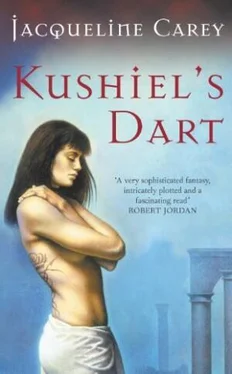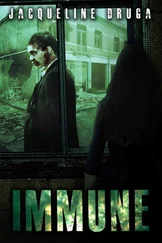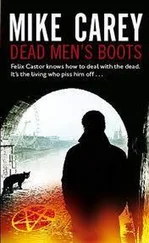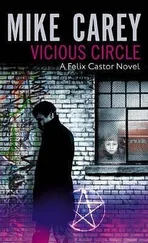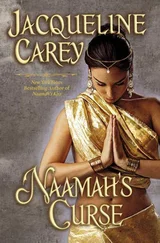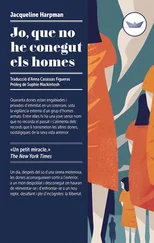Such drivel was the nature of my thoughts, for no one spoke in terms of gain and loss and political position, the possibility of poison and whether or not the royal cupbearer had mysteriously disappeared or the steward wore a new silver chain and a secret smile. These things, like so much else, I learned from Delaunay. This knowledge was not meant for the Servants of Naamah to bear. We were Night-Blooming Flowers that wilt beneath the weight of the sun, let alone politics.
So the adepts held; if the Dowaynes of the Thirteen Houses thought otherwise, they kept this knowledge to themselves and used it for what gain they might. Nothing spoils idle pleasure like too much awareness, and the Night Court was built upon idle pleasure.
What little knowledge I gained-beyond such gleanings as the fact that there are twenty-seven places on a man’s body and forty-five on a woman’s that provoke intense desire when appropriately stimulated-I learned from the lower echelons; the cooks, the scullions, the livery-servants and the stable-boys. Bond-sold or not, I had no status at Cereus House, and they tolerated me on the edges of their society.
And I had my one true friend: Hyacinthe.
For you may be sure, having tasted the sweetness of freedom and capture once, I sought it again.
Once, at least, in a season-and more often in the warm ones-I would find my way over the wall, unchaperoned, unnoticed. From the high demesnes of the Night Court, I would make my way to the tawdry apron of the City spread at the base of Mont Nuit, and there I could usually find Hyacinthe.
Along with filching goods from the market-sellers, which he did mainly out of high spirits and mischief, he did a good trade as a messenger-boy. There was always some intrigue brewing in Night’s Doorstep (so they called their quarter); some lover’s quarrel or poet’s duel. For a copper centime, Hyacinthe would carry a message; for more, he would keep his eyes and ears open, and report back.
Despite the good-natured curses directed his way, he was considered lucky, for he had spoken truly, and his mother was the lone Tsingano fortuneteller in Night’s Doorstep. As dark as her son and more so, eyes sunk in weary hollows, she wore gold, always; coins dangling from her ears, and a chain jingling with gold ducats about her neck. Hyacinthe told me it was the way of the Tsingani, to carry their wealth so.
I learned much later what he did not tell me; that his mother was outcast from the Tsingani for having done homage to Naamah with a man not of her people-who do not, anyway, reverence Blessed Elua, although I have never understood fully what they do believe-and that Hyacinthe himself, far from being a prince of the Tsingani, was street-born and a cuckoo’s child. Still, she kept the customs and I believe indeed she had the gift of dromonde , to part the veils of what-might-be. I watched once while a man, a painter coming into some fame, crossed her palm that she might read his. She told him he would die at his own hand, and he laughed; but the next time I escaped to Night’s Doorstep, Hyacinthe told me that man had died of poisoning, from wetting the tip of his paintbrush with his tongue.
Thus was my secret life, out from beneath the eye of Cereus House. The Dowayne’s Guard, of course, knew where to find me; if Hyacinthe’s trail of mischief was not easily traced, they merely did as I had come to do, and asked about of the brothel-keepers and at the wine-shops. Someone, inevitably, knew where to find us. It came to be something of a game, to see how long I might remain at my freedom, before I was caught up by a gauntleted hand and slung ignominiously over the pommel of a saddle to be returned to Cereus House.
The Guard, I think, saw it as such, for life in the Night Court was dull for a swordsman. I at least offered a challenge, albeit a small one.
The Dowayne was another matter.
After my third such escapade, she was rightfully infuriated and ordered a chastening. Straight from the pommel, struggling and squirming, I was brought to the courtyard before her. I had never seen, before that, a whipping post used for its purpose.
Other occasions blur before that vivid memory. The Dowayne sat in her chair, looking above my head. The guardsman who had brought me hither forced me to my knees, grasping my wrists together in one hand. In a trice, my wrists were bound above me to the iron ring atop the post. The Dowayne looked away. Someone behind me caught the nape of my gown and tore it open, all down the back.
I remember the air was warm and scented with flowers, a touch moist from the fountains that played freely there. I felt it upon the bare skin of my back. The marble flagstones were hard beneath my knees.
It was not a hard whipping, as such things go. Mindful of the fact that I was a child, the Dowayne’s chastiser used a soft deerskin flogger and a delicate touch, pizzicato style. But child I was, and my skin was tender, and the lash fell like a rain of fire between my naked shoulders.
The first touch was the most exquisite, the fine thongs laying rivulets of pain coursing across my skin, awakening a fiery shudder at the base of my spine. Once, twice, thrice; I might have thrilled for days at the ecstatic pain, nursing the memory of it. But the chastiser kept on, and the rivulets swelled to streams, rivers, a flood of pain, overwhelming and drowning me.
It was then that I began to beg.
I cannot recall, now, such things as I said. I know that I writhed, bound hands extended in a rigid plea, and wept, and pledged my remorse and promised never to defy her again-and still the lash fell, over and over, inflaming my poor back until I thought the whole of it was afire. Adepts of the House stood by and watched, faces schooled not to show pity. The Dowayne herself never looked; that fine, ancient profile all she would give me. I wept and pleaded and the blows fell like rain, until a warm languor suffused my body and I sagged against the post, humiliated and beaten.
Only then was I released and taken away, and my weals tended, whilst I felt fine and sore and drowsy in all of my parts, grievously punished.
"It’s a sickness in your blood," Hyacinthe told me knowledgeably when next I escaped to Night’s Doorstep. We sat on the stoop of his building in Rue Coupole, sharing a bunch of stolen grapes between us and spitting out the pips into the street. "That’s what my mother says."
"Do you think it’s true?" I had come, ever since the painter’s death, to share the quarter’s solemn awe of Hyacinthe’s mother’s prophetic gift.
"Maybe." He spat a pip in a meditative fashion.
"I don’t feel sick."
"Not like that." Although he was only a year older than me, Hyacinthe liked to act as if he had the wisdom of the ages. His mother was teaching him something of the dromonde , her art of fortunetelling. "It’s like the falling-sickness. It means a god’s laid his hand on you."
"Oh." I was disappointed, for this was nothing more than Delaunay had said, only he had been more specific. I had hoped for something more distinctive from Hyacinthe’s mother. "What does she say of my fortune?"
"My mother is a princess of the Tsingani," Hyacinthe said in a lofty tone. "The dromonde is not for children. Do you think we’ve time to meddle in the affairs of a fledgling palace whore?"
"No," I agreed glumly. "I suppose not."
I was too credulous, Delaunay would tell me later, laughing. After all, Hyacinthe’s mother took in washing and told fortunes for rabble far worse situated than any Servant of Naamah. It is true, I learned that, in much, Hyacinthe was mistaken; indeed, had he but known, it was forbidden for Tsingani men to attempt to part the veils of the future. What his mother taught him was taboo, vrajna , among his people.
Читать дальше
